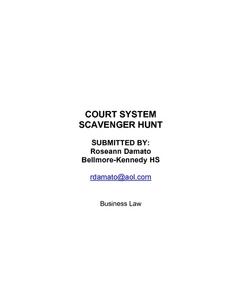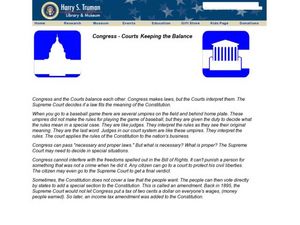PBS
The Supreme Court: Define and Classify the Powers Associated with Federalism
Federalism may sound to some like one, big vocabulary word ... but it is much more than that. A short video introduces class members to the powers associated with the Supreme Court and its role in balancing the powers under federalism.
Judicial Learning Center
The Appeal Process
Why doesn't the Supreme Court hear testimony from witnesses? How do they complete an entire proceeding in less than two hours? A helpful lesson guides scholars of criminology through these and other questions by explaining how appeals...
Curated OER
Lesson 5: In the Courtroom: Understanding the Players and the Action
Young lawyers put Goldilocks on trial as they develop an understanding of the legal system in the final activity of this five-part series. After learning about key terms relating to litigation, students are assigned roles and reading...
Curated OER
Supreme Court Decisions and Their Effect On Us
Consider five Supreme Court cases and how their outcomes have directly affected the American population. Government students research and compose a 1-2 page pager outlining the examples of our daily life that have specifically been...
Judicial Learning Center
Judicial Independence: What’s Wrong with This Court?
Why is it important for judges to operate independently of politics or other branches of government? Scholars ponder the question as they examine video clips, case studies, excerpts of the US Constitution, and an interactive computer...
Teaching Tolerance
Racial Disparity in the Criminal Justice System
Explore the impact of the war on drugs in a thought-provoking lesson for high school academics. Young historians delve into the world of the criminal justice system and the racial disparity that occurs in the US. The resource provides...
Curated OER
Science in the Court Room
Share their opinions on the use of DNA databases in criminal investigations. After reading an article, they evaluate the pros and cons of the databases and work in groups to answer discussion questions. They write a letter to a state...
Curated OER
Justice
Students discuss strengths and weaknesses of the court system in providing equal justice for all. They identify factors that cause these weaknesses and recommend solutions.
Judicial Learning Center
Article III and the Courts
What's the best way to make sense of the Constitution? A helpful lesson contains both the text of Article III and annotation of each of its sections, breaking it down into easy-to-understand parts. It also includes links to a glossary...
School Improvement in Maryland
Supreme Court Case Overview I
As part of a study of the 14th Amendment to the United States Constitution, class members examine four Supreme Court decisions—Gitlow v. New York, Mapp v. Ohio, Gideon v. Wainwright, and Griswold v. Connecticut—that incorporated the due...
Curated OER
Court System Scavenger Hunt
Students are assign a particular Federal or State Court. They are asked to make a poster of the court they have been assigned. Students are told that the poster should include a list of the types of cases that particular court hears. ...
Judicial Learning Center
Civil Rights and Equal Protection
Almost every American is familiar with the Supreme Court case of Brown vs. Board of Education. Far fewer understand the constitutional reasoning or the wide-ranging consequences of the ruling in the field of criminology. The interesting...
Judicial Learning Center
Your 4th Amendment Rights
Americans love to learn about their rights, especially those that protect them from the government's power to invade their privacy. Young people are especially engaged by this topic. An informative lesson explores four Supreme Court...
Judicial Learning Center
Your Day in Court: Criminal Justice
When a person goes on trial for a crime, what options does a court have to render justice? Who are the key players in the legal system? Interested legal scholars answer the inquiries and more using an Internet-based activity, chart, and...
Curated OER
Searching for Answers
How does a judge in the federal judicial court decide on a verdict? Give your middle and high schoolers a better idea of how final decisions are made in the judicial system. Then split your class into four groups, assigning each group a...
Curated OER
How the Supreme Court Affects the Lives of Teens
Students describe the structure and function of the United States Supreme Court. They examine and analyze decisions made by the Court. They participate in a debate about recent issues.
Curated OER
The Legacy of the Warren Court
Students examine the major decisions by the Supreme Court when Warren was the Chief Justice. In groups, they research the life and other works of Earl Warren and discuss how ones background can influence decisions. They also examine...
Curated OER
How the Court Became Supreme
Students investigate how the Supreme Court changed under the leadership of John Marshall. In this Supreme Court activity, students recognize the role of the Supreme Court as well as the significance of Marbury v. Madison. Students also...
Curated OER
Black Skin, White Justice: Race Matters in the Criminal Justice System
Students examine the effects of race in the criminal justice system. As a class, they brainstorm a list of instances when the offender has been an African American and he is not treated fairly in court based on his race. They analyze...
DocsTeach
Alfred Sinker and the Writ of Habeas Corpus in 1861
Scholars learn how the judicial system treated under-age Civil War soldiers using historical analysis. The resource uses court documents to help historians understand why Habeas Corpus was used in the case of Alfred Sinker and why he was...
Judicial Learning Center
Understanding the Types of Cases
Most young scholars are aware of the criminal courts system, but the United States Constitution allows for a much broader role. What other roles do courts play in settling other questions? A case study and WebQuest-style activities...
Curated OER
It's Your Right: A Civil Rights Brochure
Learners examine the US Constitution, Bill of Rights, and Supreme Court cases in order to broaden their understanding of the US Judicial System. They research a variety of textual and Internet resources to create a tri-fold brochure,...
Curated OER
Congress - Courts Keeping the Balance
In this checks and balances in U.S. government worksheet, students read a 5-paragraph selection regarding Congress and the Supreme Court and then respond to 3 short answer questions.
Judicial Learning Center
Judicial Independence
Most people support the idea of an independent judiciary in theory until they hear about a court case that violates their principles. An informative resource explains why the concept is important. It also provides scholars of criminology...

























